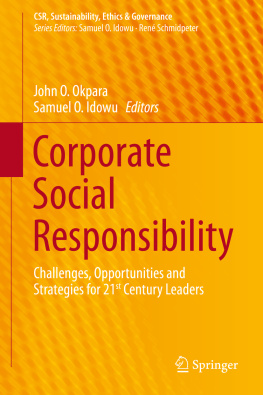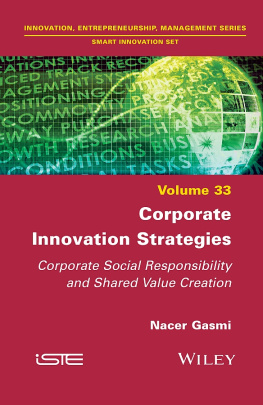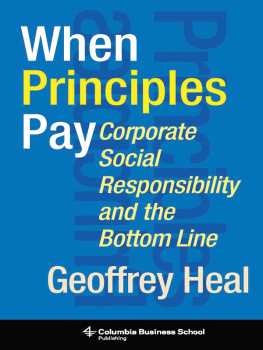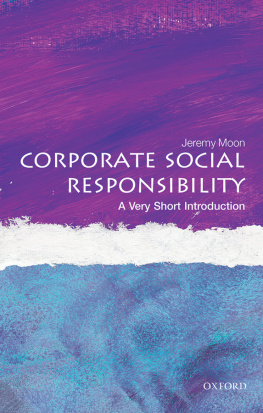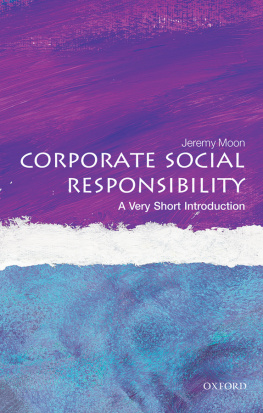1.1 Introduction
The concept of corporate social responsibility (CSR) has been the subject of considerable debate among scholars and practitioners. In spite of the ongoing debates as to what it means and what it embraces, it has developed and evolved in both academic as well as practitioner communities around the world. Although the term corporate social responsibility (CSR) is still generally used today, related concepts such as business ethics, corporate citizenship, and corporate social performance are competing to replace it (Carroll & Shabana, ). This paper is structured as follows: in the first section, we discussed the definition of CSR. In the second section, we analyzed the arguments in support of CSR. Finally, the paper concludes with summary and conclusions.
1.2 What Is Corporate Social Responsibility?
In the last two decades, several definitions of CSR have emerged in management and organizational literature. Corporate social responsibility covers the broad areas of responsibilities corporations have to the societies within which they operate. More specifically, CSR involves a business identifying its stakeholders and incorporating their needs and values within the day-to-day decision-making process. Furthermore, the notion that profit maximization is the only legitimate goal of management has been recognized as one end of a continuum, while at the other end is the recognition that corporations are the trustees of societal property that should be managed for the public good. For example, Friedman () indicates that corporations have an obligation to society other than their shareholders and beyond what is prescribed by law or business contract.
There are several definitions of CSR. However, in this chapter we will touch upon only a few definitions of CSR to illustrate its evolving nature and meaning. Here are some of the most popular ones:
The World Business Council for Sustainable Development (WBCSD) defines CSR as the continuing commitment by business to behave ethically and contribute to economic development while improving the quality of life of the workers and their families as well as of the local community and society at large (WBCSD , ).
Carroll defines social responsibility of business as encompassing the economic, legal, ethical, and discretionary expectations that society has of organizations at a given point in time (Carroll , ).
The UK Institute of Directors defines CSR as businesses and other organizations going beyond the legal obligations to manage the impact they have on the environment and society. In particular, this could include how organizations interact with their employees, suppliers, customers and the communities in which they operate, as well as the extent to which they attempt to protect the environment (Ruth Lea , ).
The European Commission on CSR defines CSR as the responsibility of enterprises for their impacts on society. Respect for applicable legislation, and for collective agreements between social partners, is a prerequisite for meeting that responsibility. To fully meet their corporate social responsibility, enterprises should have in place a process to integrate social, environmental, ethical, human rights and consumer concerns into their business operations and core strategy in close collaboration with their stakeholders, with the aim of: maximizing the creation of shared value for their owners/shareholders and for their other stakeholders and society at large, and identifying, preventing, and mitigating their possible adverse impacts (European Commission , ).
In this paper, we use Carrolls categories of CSR to illustrate the evolving nature and problems of defining CSR. The four dimensions of CSRdefined by Carroll () as economic, legal, ethical, and philanthropicaddress the incentives for initiatives that are useful in identifying specific kinds of benefits that flow back to companies, as well as society, in their fulfillment of CSR activities. Carrolls definition of CSR has been successfully used by researchers and practitioners for over two decades; we decided that this might be an appropriate definition to use for the purpose of this paper.
1.2.1 Economic Responsibility of Business
According to Carroll (, 2006).
Some scholars argue that the principle of maximizing shareholder wealth may not be in the interests of shareholders. For example, Barnett ().
Although there are differences between these two views in terms of corporate profit, the notion of economic responsibility in terms of financial profit to stockholders is accepted and required by both views. One may even argue that maximizing shareholder wealth in the long run is a fundamental principle that both views agree upon. The real difference could be that the classical economic view ignores the long-term negative effects of the application of the maximization principle. In contrast, the opposite view applies the maximization principle for long-term benefits, which entails that such a principle may be ignored in certain short-term considerations (Carroll & Shabana, ).
1.2.2 Legal Responsibility
The legal responsibility of business refers to the positive and negative obligations put on businesses by the laws and regulations of the society in which it operates (Carroll & Shabana, ) argues that the business case for CSR rests on certain presuppositions about markets and the business environment, which cannot be simply assumed, but should be positively created by a regulatory framework for CSR.
On the other hand, some oppose such claims and state that engagement in CSR activities and management of stakeholder relations should continue to remain voluntary. For example, Phillips, Freeman, and Wicks ().
1.2.3 Ethical Responsibility
Whereas economic and legal responsibilities symbolize ethical norms about fairness and justice, ethical responsibility on the other hand refers to those activities and practices that are expected or prohibited by society even though they are not codified into law (Carroll, ).

